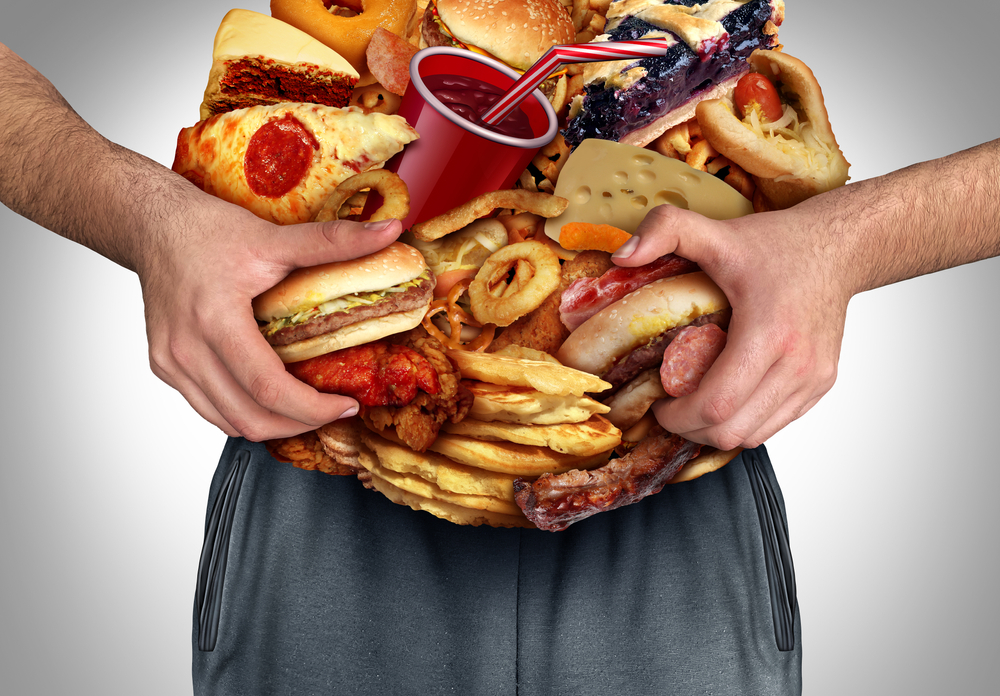How often do you eat fast food?
Let’s face it: It’s always easier to have lunch in a fast food restaurant or grab a snack on the go. Most of us are busy people, and we often find ourselves in the position of rushing to work in the morning and totally forgetting to grab a healthy meal from home. Or maybe we don’t have the necessary time for meal prep.
Excuses can be plenty, but according to the Food Institute’s analysis of data, millennials spend almost 45% of their income on eating out. And what do they eat most of the time? Fast food, of course! It’s cheaper, faster, and delicious. But is it that good for our health?
Continue reading to learn about the most harmful effects of fast food on your body, and perhaps the next time you want to order takeout, you will consider a healthier option.

1. Effect on the respiratory system
We’ve already established that fast food is always tempting to grab instead of having a salad or cooking your own meals at home. But have you ever considered its side effects on your body? A lot of people tend to forget that having an unbalanced diet combined with stress and poor sleep leads to obesity.
And believe it or not, in 2022, it’ll be one of the main issues when it comes to health. Obesity actually increases the risk of respiratory problems, including shortness of breath and asthma. All these extra pounds put a serious pressure on your heart, especially on your lungs, and shortly you will begin to notice difficulties in breathing when you’re doing normal tasks like climbing stairs or even walking.
Don’t let temptation win over your health! Focus more on what your body is trying to communicate to you because there might be a lot of red flags you don’t even know about. Don’t forget to see your doctor on a regular basis and ask them how you can start eating healthier, because no one’s ever said that eating fewer calories was bad for our well-being!
There are many amazing recipes available on the internet that, who knows, might help you develop some hidden cooking skills.
2. Fast food exceeds the daily sodium allowance
You will never believe it, but the most dangerous combination is sugar, fat, and a lot of sodium, which is usually found in most fast food meals. Of course this makes the food tastier, but at what cost? Diets that are high in sodium can lead to water retention, and this is usually the reason why you feel bloated or a bit puffy after that tasty Big Mac.
Did you ever think about how much salt was in all the fast food meals that we ate? Depends on the food, but usually it may contain more than 3,000 milligrams, which exceeds the daily recommended dose of sodium for an adult. It has been proven that your heart and cardiovascular system may be under stress due to sodium, which can also raise blood pressure that can lead to heart attacks.
That’s no joke! Take care of your body.
3. Fat and sugar
The impact of consuming too much sugar can be very bad for your health. The sweetness in sodas, cookies, and other fast foods comes from added sugar, which has been linked to cancer, type 2 diabetes, heart disease, obesity, and a host of other medical conditions.
Did you know that the American Heart Association recommends eating only 100 calories of added sugar per day? That’s around six teaspoons. Well, despite this, a lot of people are consuming more than 20 teaspoons per day. That’s a lot! For example, a regular can of Coca-Cola contains 8 teaspoons of sugar, which is around 140 calories and 40 grams of sugar.
While too much sugar can spike insulin levels, trans fats are another serious threat to people’s health. Moreover, they are usually found in processed foods like pastries, pizza dough, and fried pies, which, let’s face it, are usually our favorite snacks. Even if their taste is delicious, they can increase bad cholesterol levels and you could develop serious heart conditions.

4. Effect on the integumentary system (skin, hair, nails)
While fatigue, diabetes, and the risk of heart disease are three of the most common symptoms if you are following an unhealthy diet, eating foods that are poor in nutrients can impact your skin’s appearance as well. And in this case, certain foods like crackers, white rice, and pasta, which are refined carbs, are the ones that are damaging your skin and increasing the risk of acne.
Most studies show that those with a sweet tooth are more likely to develop skin problems, especially damage to the levels of collagen. Protect your supple skin by avoiding the candy aisle when doing your grocery shopping!
5. Effect on the central nervous system
Finger-licking fast food is always the cheapest and fastest option that we have, especially after a busy day when we don’t really have the time to cook and we are looking for an easy dinner. While delicious, most fast food meals are high in carbs, which can keep you full for a short time, but the long-term effects on our health are less favorable. Studies have shown that most Americans who eat processed pastries on a daily basis are more likely to develop depression and Alzheimer disease. Besides diabetes and the risk of cardiovascular complications, regular consumption of fast foods can alter your central nervous system and might have side effects, especially on elders.
6. Bad effects on the bones
A lot of people aren’t concerned about the amount of fast food they’re eating during a week, and that’s a huge red flag. Our health is one of the most important things in life, and we shouldn’t neglect taking care of it.
The most common disease in the past few years has been obesity, which, besides the fact that it is one of the most dangerous health issues, can also lead to a lot of complications with muscle mass and bone density. Maintaining a nutritious diet and engaging in regular exercise is mandatory for preventing bone loss and strengthening the muscles that support them.
Let’s not forget about the teeth because they are also 32 tiny bones that can also be affected by what we’re eating. Sugar and refined carbs are their main enemies because they can increase the acids in your mouth and break down the enamel. Without enamel, the teeth are weak and cavities can appear. Try to replace candy bars and other sweets and sodas with fruits like apples that contain a very small amount of natural sugar.

7. Constipation
Dietary fiber, which is often found in fruits, vegetables, whole grains, nuts, and seeds, is very important for the digestive system. As it moves wastes out of the body, fiber aids in maintaining a healthy digestive system. Fibers are also known for helping to keep your cholesterol levels within normal parameters. And of course, most fast foods don’t contain the necessary amount of fiber your body needs in order to stay healthy. Replace the to-go pastries from that coffee shop you love with oats and yogurt.
Psst! Black coffee alone also plays a huge role in keeping constipation at bay.
Takeaway:
Did you know that compared to 30 years ago, American families are now spending half their income on fast food? In the 1970s, less than 20% of families had the habit of going out for dinner. That’s something! Sadly, recent studies have shown that more than 3 out of every 10 adults in the United States are overweight, and the number of fast food restaurants has doubled since the 1970s. Wow! Can you believe it?
How many times a month do you prefer to order out instead of cooking your own meals? Tell us in the comments!
You may also enjoy: 8 Simple Tips to Reduce Sugar.








1 thought on “Is Fast Food Really That Bad? These Interesting 7 Facts Say YES”
I rarely go for fast food, Culver’s for their custard now and then.
But…my family eats Most meals out! I love my fruit and veggies
but rarely see them eat either. Both my son and daughter-in-law
are overweight where as I lost 70 # in 2020 and am keeping it off.
I am healthier at 130 than I ever was at 210.